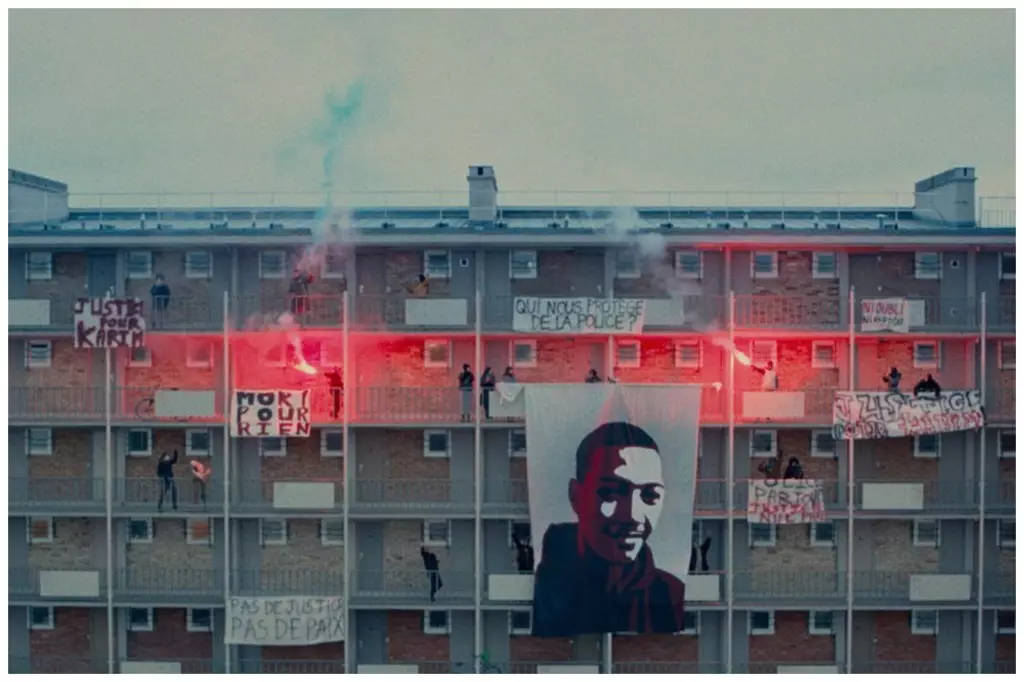French filmmaker Mehdi Fikri draws from his personal experiences as a reporter covering social conflict and police violence in France’s disadvantaged suburbs to create his debut feature film, After The Fire. Set in the outskirts of Strasbourg, the movie follows Malika, a French woman of North African descent, seeking justice for her brother’s suspicious death at the hands of the police. Fikri’s intention was not to create a documentary but a fiction film that captures the essence of politically-driven movies like “Hunger” and “No.” With a somber premise, Fikri introduces a positive aspect to the story, highlighting the protagonist’s political awakening and her determination to challenge both the police force and her own family’s traditions.
An Exploration of Political Awakening
While Malika confronts the injustice within the police force and her pursuit for justice, she also finds herself navigating the complexities of local politics. Additionally, she contradicts her family’s traditions by demanding a delayed burial to allow for an independent autopsy. Fikri aimed to craft a story that amalgamates political themes with intimacy, ultimately creating a narrative about family loyalty. He emphasizes that the film’s universal theme applies to individuals regardless of their background. The concept of standing up for family and maintaining coherence in the face of past trauma lies at the heart of Malika’s character development. Fikri adds layers of complexity by pitting the heroine against her own family, and while she pays a personal price for her fight, she remains steadfast in her pursuit of righteousness.
Singer and actress Camélia Jordana portrays the film’s lead, Malika, alongside co-stars Sofiana Zermani, Samir Guesmi, Sofian Khammes, and newcomer Sonia Faidi. Fikri commends Jordana’s involvement, describing her intelligence and generosity as instrumental in elevating the film. Jordana, known for her rising fame and outspokenness against racism and police violence, found herself drawn to the hard-hitting subject matter of the film. Through her music and songs, she has consistently shed light on issues related to police violence. Jordana’s role in After The Fire marks a pivotal point in her career, solidifying her versatility as an actress. Previous credits include notable films such as “Le Brio” and “The Things We Say And The Things We Do.”
Scheduled for release in France on November 15, After The Fire arrives at a crucial time for the ongoing debate surrounding police violence. The film’s production coincided with the tragic shooting death of 17-year-old Nahel Merzouk in Nanterre, a suburb of Paris. Fikri reveals the profound impact the incident had on the entire team, further fueling their determination to create a positive film that captures the struggles of its protagonist. By presenting a coda at the end of the film, Fikri pays tribute not only to Merzouk but also to other young men who have lost their lives at the hands of French police officers throughout the past decade.
A Universal Message and Audience Engagement
Jordana expresses her hope that After The Fire will resonate with individuals who have experienced similar family losses due to police violence. By tackling this sensitive subject matter, the film aims to convey empathy, understanding, and support to the victims’ families. In addition to reaching out to directly affected individuals, Jordana also aspires to connect with those who may be unaware of the severity of these stories. She emphasizes the need for fair media coverage and hopes that the film will foster curiosity and engagement among viewers who may be skeptical of the realities portrayed.
Mehdi Fikri’s After The Fire delves into the pressing issue of police violence in France’s underserved suburbs. With a balanced mix of political awakening, familial loyalty, and personal sacrifice, the film captures the struggle of the protagonist, Malika, as she seeks justice for her brother’s untimely death. A strong cast, spearheaded by Camélia Jordana, brings the film to life and injects it with emotional depth. As the film grapples with a reality that continues to shape society, it evokes empathy and understanding while shedding light on the need for change. After The Fire stands as a powerful and thought-provoking testament to the ongoing fight against police violence.

